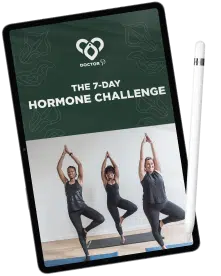LIMITED TIME OFFER | Get your Ultimate Hormone Assessment by a certified doctor for only $97 before prices go up to [$$$]!
YEAST INFECTIONS
THE ULTIMATE GUIDE TO CHOOSING THE RIGHT PROBIOTICS FOR EVERY YEAST INFECTION
March 15, 2024
Today, we’re tackling a subject that’s all about looking after your lady parts: yeast infections. I get that it’s not the most glamorous topic, but it’s something many of us face. We must stop shying away from such a common issue and shed some light on how probiotics can be your best friend when it comes to these bothersome infections. So get ready, ladies. We will get messy and learn the best probiotics for yeast infections.
What is a Yeast Infection?
Before we get into the probiotics, let’s talk about what exactly a yeast infection is. A yeast infection, also known as vulvovaginal candidiasis, is a common fungal infection that affects the vaginal area. It’s caused by an overgrowth of a type of fungus called Candida albicans, which is already in the vagina but can multiply and cause discomfort when the balance of good bacteria is flip-flopped.
What Causes a Yeast Infection?
Several factors can cause a yeast infection. Antibiotic use, hormonal changes, pregnancy, diabetes, a weakened immune system, and even certain medications can all disrupt the balance of good bacteria in the vagina, creating the perfect environment for yeast overgrowth.
Ways to Prevent Yeast Infections
While yeast infections can be super annoying, there are steps you can take to reduce your risk. Maintaining good vaginal health by practicing proper hygiene, wearing breathable cotton underwear, avoiding scented products, and steering clear of douches can all help keep your lady parts happy and balanced.
Treatment for Vaginal Yeast Infections
Girl, I know what it’s like to have a yeast infection. You will do absolutely ANYTHING to get rid of it. But don’t you worry! When it comes to treating yeast infections, there are plenty of options available to help with symptoms and restore balance to your vaginal microbiome. Chatting with your healthcare provider for personalized advice and guidance is always important.
OVER-THE-COUNTER ANTIFUNGAL MEDICATIONS
Over-the-counter antifungal medications are often the first thing suggested when it comes to yeast infections. These are typically creams, ointments, suppositories, or oral tablets with antifungals such as clotrimazole, miconazole, or fluconazole. They work by targeting the yeast to help kill off the infection. They will also provide relief from symptoms like itching, burning, and vaginal discharge.
PRESCRIPTION ANTIFUNGAL MEDICATIONS
In cases of severe or recurrent yeast infections, your healthcare provider may prescribe stronger antifungal medications. These prescription treatments may include oral fluconazole tablets or longer courses of topical antifungal creams or suppositories. It’s crucial to follow your healthcare provider’s instructions carefully and complete the full course of treatment to ensure the infection is fully eradicated.
HOME REMEDIES AND NATURAL TREATMENTS
Some women opt for home remedies or natural treatments to manage yeast infections. These may include probiotic supplements (which we’ll talk about more down below), boric acid suppositories, yogurt or garlic applied topically, or tea tree oil diluted in a carrier oil. While some people find relief from these remedies, it’s important to chat with your doctor before trying any new treatment. This is especially important if you have any underlying health conditions or are pregnant.
LIFESTYLE CHANGES AND PREVENTION STRATEGIES
In addition to treatment, making lifestyle changes and trying some preventive strategies can help reduce your risk of recurrent yeast infections. Wearing breathable cotton underwear, avoiding tight-fitting clothing, practicing good hygiene, limiting sugar and refined carbohydrates in your diet, and avoiding unnecessary antibiotic use can all help avoid yeast infections. Plus, maintaining a healthy lifestyle and supporting your immune system can also help prevent yeast infections in the future.
Probiotics and Overall Health
Probiotics aren’t just beneficial for managing specific conditions like yeast infections and are crucial in promoting overall health and well-being. Here’s how incorporating probiotics into your daily routine can benefit your entire body:
GUT HEALTH
Your digestive tract is home to trillions of good and bad bacteria, which is all known as the gut microbiome. Probiotics contain beneficial strains of bacteria like Lactobacillus and Bifidobacterium, which help maintain a healthy balance of gut flora. Probiotics help support digestion and nutrient absorption, which can help with symptoms of digestive discomfort like bloating, gas, and constipation.
IMMUNE SYSTEM SUPPORT
Did you know that a huge portion of your immune system actually resides in your gut? I know! It seems crazy, right? But, the gut plays an important role in regulating immune function and protecting against harmful pathogens. Probiotics help strengthen the gut barrier, help immune responses, and reduce the risk of infections. So, pretty much, probiotics help you stay healthy and ward off illness by supporting a healthy immune system.
MENTAL HEALTH AND MOOD
We all know what it’s like to eat too much or not eat enough, right? The slang word “hangry” comes to mind. The gut-brain connection is totally fascinating, and new evidence suggests that probiotics may positively impact mood regulation, stress resilience, and cognitive function. By reducing inflammation, probiotics may help alleviate symptoms of anxiety, depression, and mood disorders.
SKIN HEALTH
Your skin is another major barrier that interacts closely with the external environment. Imbalances in the gut microbiome have been linked to various skin conditions, including acne, eczema, and psoriasis. Probiotics can help support skin health by reducing inflammation, strengthening the skin barrier, and promoting the production of antimicrobial peptides. Including probiotics in your daily skincare regimen may create a clearer, more radiant complexion.
HEART HEALTH
Having a healthy balance of gut bacteria may also benefit heart health. Probiotics have been shown to help lower levels of LDL cholesterol and triglycerides, reduce blood pressure, and improve markers of cardiovascular risk.
Best Probiotics for Yeast Infections
Ah, now for the good stuff – probiotics! Probiotics are packed with good bacteria that can help balance all that vagina bacteria and keep those pesky yeast infections away. But with so many options out there, how do you know which probiotics are the best for yeast infections? Well, that’s where Doctor P comes in. I have gathered a list of my absolute faves. You’ll find it below!
- Optibac Probiotics For Women
- Physician’s Choice Vaginal Probiotics for Women
- Happy v Dr. Formulated Vaginal Probiotics for Women
- Good Girl Probiotics
- Garden of Life, Dr. Formulated Women’s Probiotics Once Daily
- Metagenics UltraFlora Women’s
Probiotic supplements have live microorganisms, including various strains of lactobacillus. These microorganisms can help maintain the balance of bacteria in your gut and vagina. When choosing the right probiotic supplement, it’s important to look at:
- The number of colony-forming units (CFUs)
- The different strains of bacteria included
- Any potential side effects
Probiotics are normally safe for most people, but some individuals may have some mild side effects like gas or bloating.
So, whether you’re dealing with pesky yeast infections or simply looking to maintain a healthy vagina, probiotics can help make you feel amazing from the inside out.
The 7-Day Hormone Challenge
Instantly access actionable steps and data-driven strategies to conquer hormonal imbalance and gain quick wins day by day!
The Ultimate Hormone Assessment
Understand your hormonal imbalance type with our signature 48-question quiz, designed to uncover the root of your symptoms!
The Madame Estrogen Mastermind
Access a comprehensive solution to say goodbye to your hormonal imbalance!
The Hormone Wellness Network
Embody hormone harmony. Unleash your inner wonder woman — masterclasses, accountability, sisterhood, access to Doctor P, and more!




